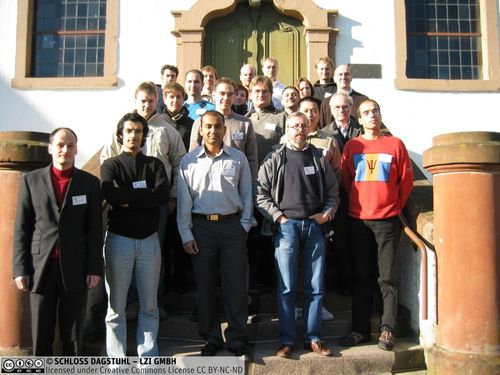Dagstuhl-Seminar 05471
Computational Proteomics
( 20. Nov – 25. Nov, 2005 )
Permalink
Organisatoren
- Christian Huber (Universität des Saarlandes, DE)
- Oliver Kohlbacher (Universität Tübingen, DE)
- Knut Reinert (FU Berlin, DE)
Kontakt
Press Release
Pressemitteilung vom 11.11.2005:
"Bioinformatiker und Proteomforscher treffen zusammen" (German only)
The Dagstuhl Seminar on Computational Proteomics brought together researchers from computer science and from proteomics to discuss the state of the art and future developments at the interface between experiment and theory. This interdisciplinary exchange covered a wide range of topics, from new experimental methods resulting in more complex data we will have to expect in the future to purely theoretical studies of what level of experimental accuracy is required in order to solve certain problems. A particular focus was also on the application side, where the participants discussed more complex experimental methodologies that are enabled by more sophisticated computational techniques. Quantitative aspects of protein expression analysis as well as posttranslational modifications in the context of disease development and diagnosis were discussed. The seminar sparked a number of new ideas and collaborations and resulted in joint grant applications and publications.
Seminar Conclusion
The seminar on Computational Proteomics was a full success, as has been confirmed by its participants. Bringing together scientist from different communities - from computer science and life sciences - turned out to be fruitful indeed. Traditionally, proteomics and bioinformatics/computer science are mostly disjoint communities with separate meetings and conferences. The chance to get insights into the problems and challenges both of the experimental and computational world, the need to learn and understand the idiosyncratic "languages" and "vocabulary" of the different disciplines was well appreciated by the attendants. Validation of proteomics data generation and evaluation was spotted as one of the most challenging issues in the application of proteomics as a technology for clinical diagnosis and monitoring. Participants from the two communities were exposed to new ideas, concepts, and techniques - both experimentally and computationally - they were not previously aware of. These ideas were then discussed over a glass of wine or two until late at night. The seminar produced a number of personal contacts which was positively remarked by the participants. In addition to the interaction and personal contacts ofthe attendants, the quiet atmosphere of the location also allowed ample time for developing new ideas for solving proteomic challenges.
- Behshad Behzadi (Inst. Pasteur et LIX (Paris) & MPI (Berlin), FR)
- Sebastian Böcker (Universität Bielefeld, DE) [dblp]
- Tim Conrad (FU Berlin, DE) [dblp]
- Jens Decker (Bruker Daltonik GmbH, DE)
- Nathanaël Delmotte (Universität des Saarlandes, DE)
- Clemens Gröpl (FU Berlin, DE)
- Christian Huber (Universität des Saarlandes, DE)
- Oliver Kohlbacher (Universität Tübingen, DE) [dblp]
- Eva Lange (FU Berlin, DE)
- Wolf D. Lehmann (DKFZ - Heidelberg, DE) [dblp]
- Sébastien Li-Thiao-Té (Institut Curie - Paris, FR)
- Rune Mattiesen (University of Southern Denmark - Odense, DK)
- Nico Pfeifer (Universität Tübingen, DE) [dblp]
- Amol Prakash (University of Washington - Seattle, US)
- Knut Reinert (FU Berlin, DE) [dblp]
- Christian Schley (Universität des Saarlandes, DE)
- Hartmut Schlüter (Charité - Berlin, DE)
- Johannes Schuchhardt (MicroDiscovery GmbH - Berlin, DE)
- Ole Schulz-Trieglaff (FU Berlin, DE)
- Benno Schwikowski (Inst. Pasteur et LIX (Paris) & MPI (Berlin), FR) [dblp]
- Marc Sturm (Universität Tübingen, DE)
- Andreas Tholey (Universität des Saarlandes, DE) [dblp]
- Nora Christina Toussaint (Universität Tübingen, DE)
Verwandte Seminare
- Dagstuhl-Seminar 08101: Computational Proteomics (2008-03-02 - 2008-03-07) (Details)
- Dagstuhl-Seminar 13491: Computational Mass Spectrometry (2013-12-01 - 2013-12-06) (Details)
- Dagstuhl-Seminar 15351: Computational Mass Spectrometry (2015-08-23 - 2015-08-28) (Details)
- Dagstuhl-Seminar 17421: Computational Proteomics (2017-10-15 - 2017-10-20) (Details)
- Dagstuhl-Seminar 19351: Computational Proteomics (2019-08-25 - 2019-08-30) (Details)
- Dagstuhl-Seminar 21271: Computational Proteomics (2021-07-04 - 2021-07-09) (Details)
- Dagstuhl-Seminar 23301: Computational Proteomics (2023-07-23 - 2023-07-28) (Details)
- Dagstuhl-Seminar 25351: Computational Proteomics (2025-08-24 - 2025-08-29) (Details)


